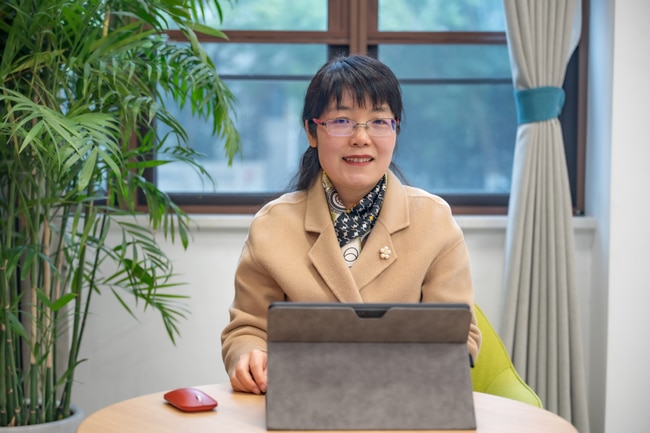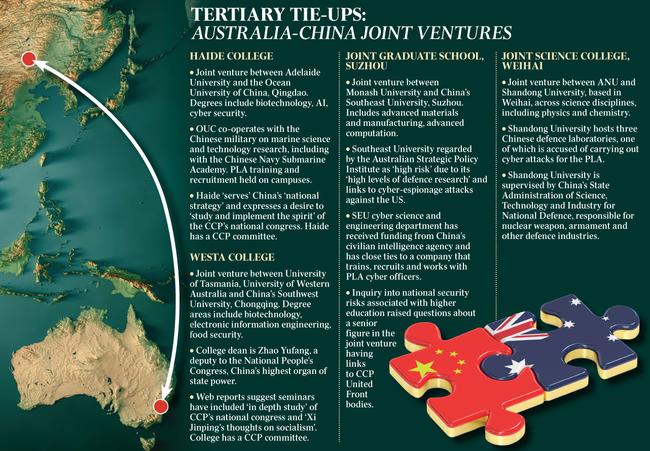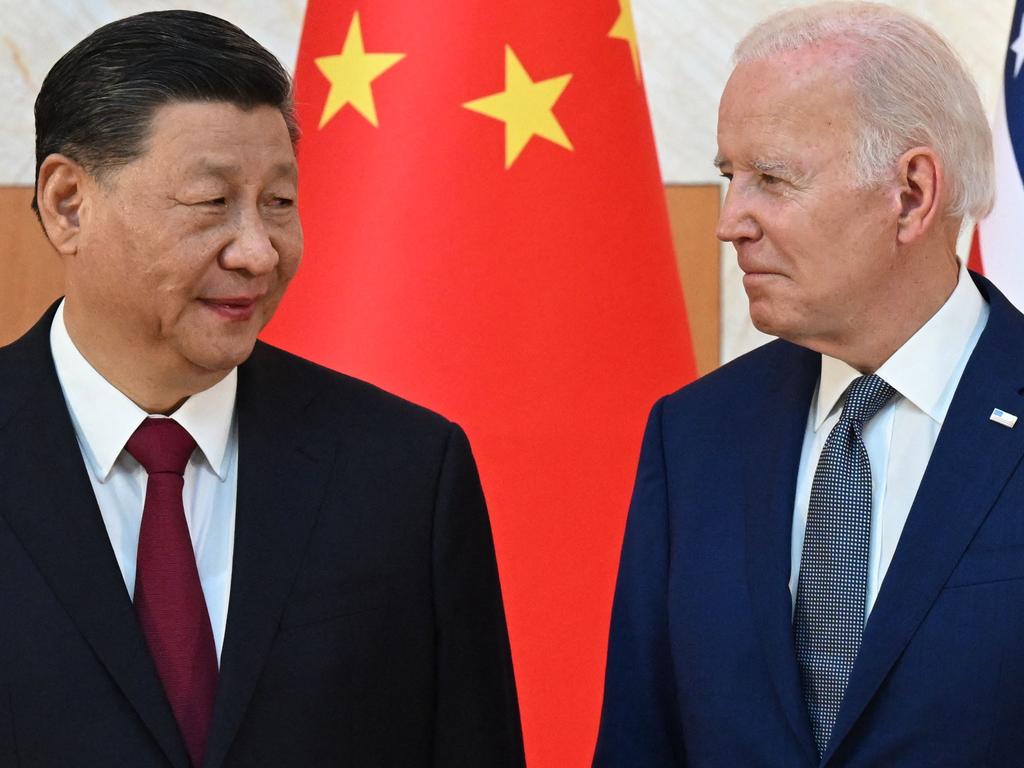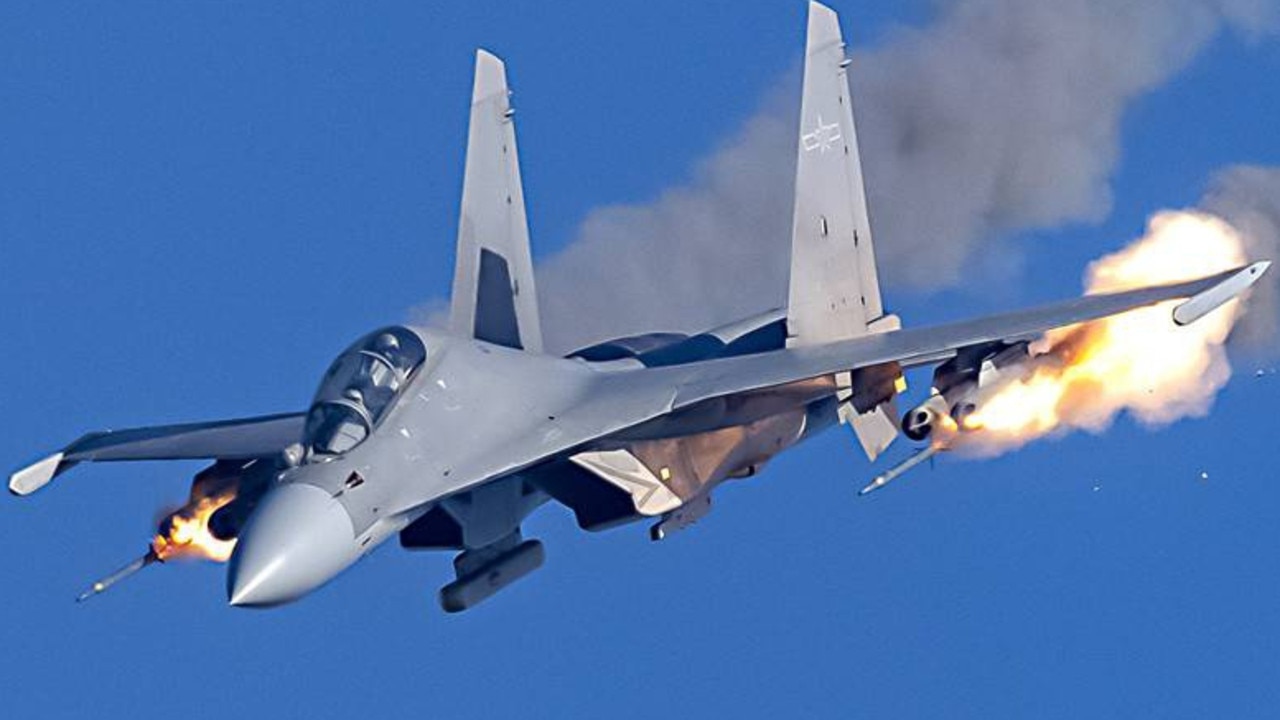Submarine, cyber attack and CCP links in China-Australia university deals
Australian universities have struck ‘disturbing’ joint ventures with Chinese counterparts with deep defence links, including to submarine and cyber warfare programs.

Australian universities have struck “disturbing” joint ventures with Chinese counterparts with deep defence links, including to submarine and cyber warfare programs, while one joint college is run by a senior Communist Party figure.
They include some of the nation’s top tertiary institutions, with recent estimates of 150 joint ventures between Australian and Chinese universities.
The Weekend Australian has confirmed some of these Chinese partners, such as Shandong University, Ocean University of China (OUC) and Southeast University, have well established and in some cases highly sensitive links to Chinese military research.
Joint ventures with Australian universities typically create colleges or joint degree programs in which Chinese students receive dual qualifications, studying half in Australia and half in joint venture colleges attached to the Chinese partner university.
Some are longstanding, others relatively new, as the lucrative overseas student trade recovers, post-pandemic.
China’s Education Ministry recently announced new measures to “strengthen supervision” of its foreign university joint ventures, including to “establish a law enforcement and punishment mechanism”. This follows apparent concern that influence could flow both ways, given “the vast number of scholars” in foreign joint venture courses. Haide College is a joint venture between Adelaide University and Ocean University of China (OUC), Qingdao, offering a range of degrees including biotechnology, AI and cyber security.
According to the Australian Strategic Policy Institute, OUC co-operates with the Chinese military on marine science and technology research, including projects with the Chinese Navy Submarine Academy. Haide College web pages suggest it “serves” China’s “national strategy” and has a CCP committee that promotes CCP policies. OUC president Yu Zhigang described the joint venture with Adelaide University as “close and far reaching”.

OUC has held PLA recruitment drives and military training at the same campus (Laoshan in Qingdao) where Haide College is based and features gun-toting PLA soldiers on its website.
In October 2022, the US Attorney’s Office announced espionage charges against four Chinese nationals, saying their operations involved using an OUC institute “as cover for their clandestine intelligence activities”. These included “targeting professors at American universities and others … with access to sensitive information and equipment” and trying to recruit Americans to “betray” their nation.
University of Adelaide, which could play a role in skilling the workforce for Australia’s nuclear submarine program, played down concerns about its OUC relationship.
“University of Adelaide supports the Australian government’s national security agenda by giving foreign compliance obligations priority consideration before proceeding with any international engagements,” a spokesman said. “The university has in place a number of resources and tools to assist university personnel to understand and navigate the various regulatory compliance regimes that apply to the university’s foreign engagement activities.”
Westa College is a joint venture between the University of Tasmania, University of Western Australia and China’s Southwest University, Chongqing, with degree areas including biotechnology, electronic information engineering and food security. Dean of Westa is Zhao Yufang, a deputy to the National People’s Congress, China’s highest organ of state power.
Westa College’s website suggests that in May it hosted an “in-depth study” of CCP’s national congress positions and “Xi Jinping’s thoughts on socialism” and that it has its own CCP committee. UTAS general counsel Jane Beaumont said all its deals with foreign universities were “carefully assessed for potential risks, including the risk of foreign interference”.
“The university complies with all national security-related legislation,” she said. “This includes notifying the Australian government of all proposed arrangements with foreign governments and with foreign universities that do not have institutional autonomy. All existing articulation agreements have been assessed through this process.”
A University of Western Australia spokesman said it was “committed to acting in the national interest at all times and continues to engage with relevant government agencies to ensure any international collaborations in which we participate comply with that commitment”.
A Joint Graduate School has been set up as a joint venture between Monash University and China’s Southeast University (SEU), Suzhou, offering studies including advanced materials and manufacturing and advanced computation. The Australian Strategic Policy Institute classes SEU as “high risk” due to its “high levels of defence research” and links to cyber-espionage attacks.
ASPI notes that SEU’s cyber science and engineering department has received funding from China’s civilian intelligence agency and has close ties to a company that trains, recruits and works with PLA cyber officers.
A recent inquiry by the Australian parliamentary joint committee on intelligence and security raised questions about alleged “close ties” between the president of Monash’s joint venture, pro vice-chancellor Aibing Yu, and CCP United Front organisations.
In response, Monash suggested Professor Yu’s “ties and connections” with the Chinese government “would be expected”.
On Friday a Monash spokeswoman said: “In forging partnerships with any overseas nation, conducting joint research or education, or operating within a foreign country, Monash is committed to managing foreign interference risk appropriately and consistently within the (government’s agreed) guidelines.
“Monash provides regular briefings for government and agencies – upon request – at state and federal level on our operations in international locations. We also seek regular guidance from the government. Professor Aibing Yu is an Australian citizen, a highly regarded scientist and a distinguished academic.”
Joint Science College is a joint venture between the Australian National University and Shandong University, based in Weihai, focusing on science disciplines including physics and chemistry.
According to ASPI, Shandong University hosts three Chinese defence laboratories, one accused of carrying out cyber attacks for the PLA. ASPI says Shandong University is supervised by China’s State Administration of Science, Technology and Industry for National Defence, responsible for nuclear weapons, armament and other defence industries.
However, an ANU spokeswoman said all its partnerships “undergo comprehensive due diligence processes when they are established and are regularly monitored and assessed”.
Clive Hamilton, a China influence expert and author, said: “The Australian universities say that they insist on academic freedom when entering these ventures, but in practice they are willing to interpret academic freedom quite flexibly – always bending it in the direction of the Chinese Communist Party. Money speaks and it speaks Mandarin.”





